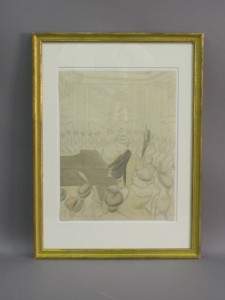 I hung a caricature by Max Beerbohm on my living-room wall late yesterday afternoon–and thereby hangs a tale.
I hung a caricature by Max Beerbohm on my living-room wall late yesterday afternoon–and thereby hangs a tale.
To begin with, please don’t be embarrassed if you don’t know who Max Beerbohm was. He liked to claim that there were only 1,500 people in England and another thousand in America who understood and appreciated his work. I don’t know whether he would have admitted me to their rarefied ranks, but he’s certainly one of my all-time favorite writers, an essayist of uncommon elegance and wit who was also a wickedly funny drama critic, the greatest parodist who ever lived, and–this is where it starts to get interesting–a caricaturist of lethally comic exactitude.
I can think of more than a few distinguished artists, musicians, and choreographers who have also been very good writers, but the list of distinguished writers who were also distinguished artists is short to the point of invisibility. James Thurber qualifies–if anything, his drawings are better than his essays–and so, needless to say, does Max. (He signed his caricatures with his first name only, and as a result is customarily referred to in that manner by his admirers.) Being a superior writer, it stands to reason that Max should have left behind this typically lucid explanation of his artistic method:
The most perfect caricature is that which, on a small surface, with the simplest means, most accurately exaggerates, to the highest point, the peculiarities of a human being, at his most characteristic moment, in the most beautiful manner….The whole man must be melted down in a crucible and then, from the solution, fashioned anew. Nothing will be lost but no particle will be as it was before.
No verbal description can begin to suggest how well Max practiced what he preached. You have to see for yourself, so go here, here, and here to look at his caricatures of three eminent Edwardians, Oscar Wilde, John Singer Sargent, and Frank Harris.
I’ve seen reproductions of hundreds of Max’s drawings, but I don’t know the last time his work was exhibited in this country. Most of his best-known caricatures now belong to museums and other public institutions in England. I’ve never seen a Beerbohm on display in any American museum, major or otherwise, and the only one I’ve seen in private hands was hanging in Whit Stillman’s Greenwich Village living room when I interviewed him in 1998 for an article about The Last Days of Disco (it’s reprinted in A Terry Teachout Reader). It seemed almost too good to be true that Whit should have owned one–he is, like Max, something of a dandy–and when I saw it on his wall, I found myself in the grip of an attack of envy so powerful that I feared I might have to take up grand larceny on the spot.
It never occurred to me, then or later, that I, too, might someday own a Beerbohm, so I was astonished when I looked him up on eBay last month and found that one of his lesser-known efforts, a 1913 drawing of Percy Grainger playing piano for a group of society ladies, was being offered for sale by an auction house in Dallas. A quick scan of my bookshelves confirmed that it was a rarity: Grainger is nowhere mentioned in N. John Hall’s Max Beerbohm Caricatures or Lord David Cecil’s Max: A Biography, nor is Max’s name to be found in any of the various books about Grainger that I own. At the same time, I thought it more than likely that they had met at one time or another. Max, after all, was one of Edwardian London’s most inveterate diners-out, while Grainger first made a name for himself as a society pianist.
Now it’s mine, and I’m insanely proud to own it. The Teachout Museum contains no better-loved piece.
